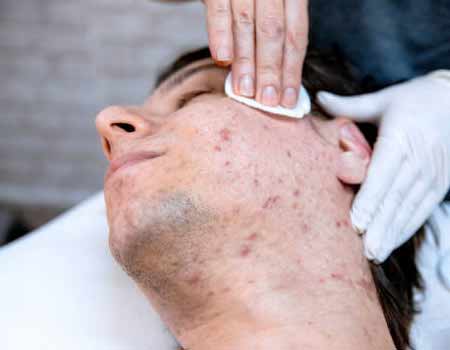Acne is a common skin condition where the pores of your skin obstruct. Pore blockages produce blackheads, whiteheads and different sorts of pimples. Pimples are pus-filled, sometimes painful, bumps on your skin.
Consult best acne doctor in Vijayawada for acne treatment
The clinical term for skin acne is acne vulgaris.
What are the types of acne?
- Fungal acne (pityrosporum folliculitis): Fungal acne happens when yeast builds up in your hair follicles. These can be itchy and inflamed.
- Cystic acne: Cystic acne causes deep, pus-filled pimples and nodules. These can cause scars.
- Hormonal acne: Hormonal acne influences adults who have an overproduction of sebum that clogs up their pores
- Nodular acne: Nodular acne is an extreme type of acne that causes pimples on the surface of your skin, and tender, nodular lumps under your skin.
Schedule an appointment at acne treatment clinics in Vijayawada

What are the symptoms of acne?
Acne symptoms on your skin include:
- Pimples (pustules): Pus-filled bumps (papules).
- Papules: Small and discoloured bumps, frequently red to purple or darker than your natural skin complexion.
- Blackheads: Plugged pores with a black top.
- Whiteheads: Plugged pores with a white top.
- Nodules: Large lumps under your skin that are difficult.
- Cysts: Painful fluid filled (pus) lumps under your skin.
Triggers of Acne:
- Hormonal changes: Fluctuations in hormone levels, such as during puberty, menstrual cycles, or hormonal disorders, can contribute to acne development.
- Excess oil production: Increased production of oil (sebum) by the sebaceous glands can contribute to clogged pores and acne formation.
- Bacterial growth: The bacteria Propionibacterium acnes, which naturally resides on the skin, can multiply in clogged pores, leading to inflammation and acne.
- Dead skin cell buildup: Excessive accumulation of dead skin cells can clog pores and contribute to acne breakouts.
- Certain medications and cosmetics: Some medications, such as corticosteroids or lithium, and certain cosmetics or skincare products that are comedogenic (tend to clog pores) can trigger or worsen acne.
Acne treatment
There are some common approaches to acne treatment:
- Topical treatment: Over-the-counter creams, gels, or moisturizers containing ingredients like benzoyl peroxide, salicylic acid, or retinoid can assist with reducing the acne. These products work by unclogging pores, decreasing inflammation, and promoting skin cell turnover.
- Oral Medications: In more severe cases of acne, oral medications may be prescribed. Antibiotics like tetracycline or erythromycin can help control bacterial growth, while hormonal treatments like oral contraceptives (for females) or anti-androgen medications (such as spironolactone) can address hormonal imbalances.
- Prescription Medications: If over-the-counter treatments don't provide sufficient results, a dermatologist may prescribe stronger topical medications such as topical antibiotics, stronger retinoid, or combination products containing multiple active ingredients.
- Professional procedures: Dermatologists might carry out specific procedures to treat acne. These can include chemical peel, microdermabrasion, light treatment, or extraction of acne lesions. These procedures can assist with exfoliating the skin, reducing oil production, kill bacteria, and improve the appearance of acne scars.
- Lifestyle and Skincare Practices: Alongside medical treatments, adopting a good skincare routine is important. This includes gentle cleansing with mild products, avoiding excessive scrubbing or picking at acne lesions, and using non-comedogenic (non-pore-clogging) moisturizers and cosmetics. Maintaining a healthy lifestyle, including a balanced diet, regular exercise, stress management, and adequate sleep, can also contribute to overall skin health.
Are you a candidate for Acne Treatment?
The chances that you are eligible for treatment are extremely high. Whether or not you have mild, moderate, or severe acne, you are likely a candidate for one or more of the treatments at our office. You might be a candidate for our acne treatments if you need to:
- Eliminate blackheads and whiteheads
- manage pimples and breakouts
- Treat acne-causing bacteria
- Minimise skin irritation
- Lessen post-inflammatory hyperpigmentation
- Correct acne scarring
Visit cosmetic clinics in Vijayawada
Prevention and Management of Acne:
- Keep the skin clean: Gently cleanse your face twice a day using a mild cleanser to remove excess oil, dirt, and dead skin cells. Avoid over-washing or scrubbing, as it can irritate the skin and worsen acne.
- Avoid excessive sun exposure: While limited sun exposure can have a temporary positive effect on acne, excessive sun exposure can lead to skin damage and worsen acne in the long term. Use sunscreen and protective clothing when outdoors.
- Manage stress: Stress can contribute to hormonal imbalances that may trigger acne. Practice stress management techniques like exercise, meditation, or engaging in hobbies to help reduce stress levels.
- Don’t touch the face: Touching or picking at acne lesions can introduce bacteria and worsen inflammation. Avoid touching your face and keep your hands clean.
- Use non-comedogenic products: Choose skincare and cosmetic products labelled as non-comedogenic or oil-free to minimize pore clogging.
- Maintain a healthy diet: Eat a balanced diet rich in fruits, vegetables, whole grains, and lean proteins. Limit intake of processed foods, sugary snacks, and dairy products, as they may worsen acne in some individuals.
- Seek professional advice: If over-the-counter products do not effectively manage your acne or if you have severe acne, consult a dermatologist at best acne hospital in Vijayawada. They can provide personalized treatment options, such as topical medications, oral medications, or in-office procedures.